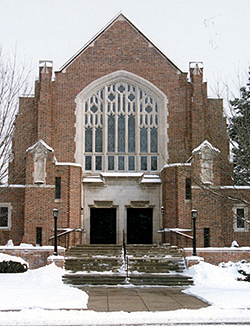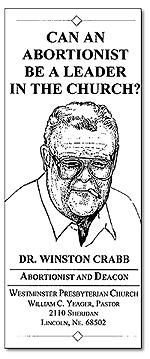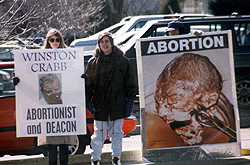































|
 November/December, 1998 Volume XIII Number 3
November/December, 1998 Volume XIII Number 3


Pickets at abortionist's church spark First Amendment fight
by Paul deParrie
Lincoln, NE - Last year, when Rescue the Heartland began picketing Westminster Presbyterian Church because they had an abortionist as an elder, the group had no idea of the results. They hoped, after attempts to quietly confront the church, that Winston Crabb would be confronted by the church or removed. Pro-life activists have targeted the church because one of its governing board members, Crabb, an abortionist in Lincoln and Omaha (Life Advocate, May/June 1997).
Instead, after more than 18 months of regular pickets, the church located at 2110 Sheridan Boulevard - and a number of local religious leaders - are attempting to stop the demonstrations.
On September 14, after an emotionally charged ordinance to control anti-abortion picketing at the church cleared the City Council on a 4-3 vote and headed straight into the jaws of a mayoral veto or a massive First Amendment court battle.
Summer heat
It was a long, hot summer of debate in the Nebraska community. The salvo in reply to Rescue the Heartland was fired by church officials who hired an attorney to present he idea of an anti-picketing ordinance to the city council. The first draft was presented in June.
This will likely cause a clash between two cornerstones of the First Amendment: freedom of speech and freedom of religion. The attorney,Alan Peterson, has frequently worked with the Nebraska Press Association and the Lincoln Journal Star, on First Amendment issues.
Peterson said his work on the ordinance was "different" from his normal work defending First Amendment rights, "but not in conflict." However, on June 24, the Journal Star, in the first of two editorials opposing the proposed ordinance, expressed some dismay at Peterson's involvement.
Promoters of the ordinance seemed to tear a page from the Clinton Administration playbook by insisting that the ordinance was being sought "for the children."
"We need to find a way through this maze so rights on all sides are being protected," said the Bill Yeager, senior pastor at Westminster. "Right now, we feel the rights of free assembly for children are being violated."
Peterson claimed that one family, after 10 years, left Westminster because they feared repeated anti-abortion protests were leaving emotional scars on their children. Another family was said to have claimed that their children became nervous and sick at the thought of going to church after protesters confronted them with pictures of aborted babies. Others allege that screaming protesters "horrified and shocked" their young children by by chasing them and screaming derogatory phrases like, "You're lucky Dr. Crabb didn't abort you" and "You go to church with murderers."
However, most of all the allegations were presented by Peterson were "anonymous," and only one out of dozens were even reported to police.

This is a sample of the literature rescue the heartland distributes at the Westminster Presbyterian Church
Peterson's ordinance, outlined in a pre-council meeting, would make it unlawful to picket within 100 feet of a religious activity one half hour before and one half hour after the service. This would remove demonstrators from the public sidewalk in front of the church and put them across a busy, four-lane street, when churchgoers are both coming and going, thus removing thier target audience entirely.
Larry Donlan, director of the Omaha-based anti-abortion group, called the effort "a blatantly unconstitutional maneuver." He said any ordinance would infringe upon the free speech rights of his members.
"I think this is so absurd," he said. "It's so hypocritical and dishonest. If what Dr. Crabb does for a living is such a wonderful thing, why can't they stand to see pictures of examples of his work?"
Rescue the Heartland, however, members say they have made one concession out of concern about the effect their presence and photos might have on children. They say they no longer picket the south entrance to the church so children and others can enter there.
Media coverage in both Lincoln's and Omaha's papers and television stations has been extensive all summer. Pro and con letters to the editor were regular features in their pages.
One letter writer, Henry Eugene Brass (Lincoln Journal Star, June 26) noted, "As one who is admittedly ambivalent concerning abortion, I still can't escape the screaming irony of the proposed Westminster ordinance's stated purpose: To protect children from the violence of graphical depictions of violence to children."
Donlan is pleased with the coverage because it brings attention to the plight of aborted babies.
"Even when the Monica Lewinsky stories appeared and Starr Report was released, this story still dominated our news coverage," said Donlan. "Pictures of the babies appeared regularly on the news. One newspaper came with a warning in large black print - WARNING; Graphic photo of aborted fetus on page 5A."
Official debate
When the ordinance was presented to the Lincoln City Council on June 22, the response was immediate.
"It's a matter of presenting this as a civic problem in front of the council," Peterson said. In addition, church members have collected signatures from 3,000 people who support "protecting children from public protests."
"We feel that such an ordinance can be constitutional and enforceable," Yeager said. "Picketers can still be there, but they may not interfere with the attendance of children."
The group presented council members with photographs of protesters carrying their graphic signs.
Following Peterson's presentation, some officials expressed doubts.
City Attorney Bill Austin rejected it as unconstitutional. He said the protesting at Westminster was protected speech, was occurring in a First Amendment forum, and children are everywhere in society.
"How far can you go in saying, 'if children are involved,'" Austin said.
Police Chief Tom Casady also expressed a reservation about an ordinance. He said if the council passes an ordinance later found unconstitutional, a police officer enforcing it could be found liable.
Casady said police are present at Westminster every Sunday and while one disturbing-the-peace case involving Westminster protesting was dismissed by prosecutors, officers have received conflicting accounts on other incidents. He said police had no reported incidents of protesters grabbing, chasing or physically blocking children at the church. In fact, in a newspaper article, Casady said the protesters were "calm, orderly, and polite."
Attempts to use the law against abortion picketers have a record of mixed success in Lincoln. Last year, for example, U.S. District Judge Warren K. Urbom threw out some of the charges against protesters who had picketed at the home of abortionist Crabb. Urbom ruled the law was an unconstitutional infringement against free speech.
While several City Council members still embraced the idea of an ordinance. Council member Dale Young, who favors a tougher city ordinance against abortion protesters, supported public flogging as the new penalty.
"Our children are being dragged down in this process by his holy war," one council member said. "It's got to stop."
A second hearing was held on August 17, but the dividing lines were even more sharply drawn.
City Attorney Bill Austin delivered his final argument, saying the ordinance is almost certainly unconstitutional and, if passed, he wouldn't defend it.
Mayor Mike Johanns said city administrators have a responsibility to make a judgment call, and "every piece of legal advice I can get says this ordinance is unconstitutional."
Johanns said he would veto it.
Pro-aborts' claims refuted
This pre-council meeting began with undercover surveillance videotape shot on three Sundays by police officers at Westminster. The silent tape showed picketers holding large signs as churchgoers walked past. But it showed no confrontations.
"That's what you're seeing and what the police are seeing," Austin said.
Further testimony came from Rick Duncan, a University of Nebraska-Lincoln constitutional law professor, who said the proposed ordinance had "serious constitutional problems."
"What Mr. Peterson is asking you to do is criminalize one side of the debate," Duncan said.
Duncan said the ordinance would almost certainly lead to "protracted constitutional litigation," the city would likely lose. It could cost hundreds of thousands of dollars to defend, he said.
"Where's their videotape?" Donlan said. "They have zero evidence. Instead, what [the Westminster parishioners] have done is constructed a tower of babbling lies."
Council members delivered their ruling: A Sept. 8 public hearing on Peterson's ordinance as introduced by Councilwoman Coleen Seng.
"I think we need to move this forward and get it on a public agenda," Seng said.
Religious abortionists
Days prior to that meeting, on September 3, about 100 people of different faiths, mostly clergy, gathered on the steps of Westminster Presbyterian Church to champion "the cause of religious freedom."
The demonstration and press conference, organized through the help of the Lincoln Interfaith Council, was intended to show widespread community opposition to Sunday picketing by pro-life protesters who have targeted the church because one of its members performs abortions.
Lauren Ekdahl, pastor of Trinity United Methodist Church and leader of the demonstration, noted that freedom of religion is mentioned before freedom of speech in the Bill of Rights.
"How is it we deal with each other in the midst of theological differences?" he asked. "There is an appropriate way to do that and we don't believe what is displayed here is appropriate."
"Churches who stand in solidarity with child-killing should fear God," Donlan responded to local media.
The participants in the demonstration signed a statement supporting "unencumbered exercise of religion." While not endorsing the specific language of the proposed ordinance, the statement said in part:
"We believe that community standards made apparent and supported by the Lincoln Interfaith Council and its 60 member churches and religious organizations should be upheld, by ordinance if necessary, to preserve the tolerant and respectful relationships that have been, and continue to be, the hallmark of the true expression of religious freedom in a democratic society and the city of Lincoln in particular."
However, the statement did not mention the "religious freedom" of the demonstrators.
Ross Tyler, pastor of Vine Congregational Church, suggested picketers showing photos of aborted fetuses to children coming to church is a form of child abuse.
"I have a sense of personal outrage that children . . . are being abused by adults intentionally to try to get the attention of other adults," he said.
Several others said they were not taking sides in the abortion issue, but merely registering disapproval of the picketers' methods. The proposed ordinance, they said, would not interfere with free speech while protecting the right of worshippers to walk peacefully to church, said the Joel Gajardo, director of the Hispanic Community Center.
"We need to protect the right of people to come to a worship place in an atmosphere so that they can get the best of their spiritual experience," he said.
"It's not right to harass people going to church or to their place of faith," said the John Tyler, pastor of St. Paul United Church of Christ.
Signers of the statement, which was presented to the City Council on September 8, represented many Protestant denominations, Orthodox Christians, people of Jewish faith, Unitarians, Baha'is, Hindus and Sikhs, said the Norman Leach, director of the Interfaith Council. No Roman Catholics were represented.
Timothy Thorburn, chancellor of the Lincoln Catholic Diocese, noted that Fabian Bruskewitz, the local Catholic bishop, has taken no official position on the issue of picketing at churches.
"I think it's a free speech issue," Thorburn said. "I think it would be appropriate to picket at a church if there was an issue someone felt the need to express their speech on."
No Catholic leaders attended the City Council hearing.
Donlan was dismayed that scores of clergy would show up "to protect a child-killer" but that few Christian pastors would "stand up for the babies."
"Liberal churches are more concerned with being politically correct than biblically correct," said Donlan concerning the Christian pastors who have denounced him after hearing Westminster's claims.
The showdown
 On September 15, the Lincoln City Council passed a final version of the ordinance.
On September 15, the Lincoln City Council passed a final version of the ordinance.
"Yes, I will veto it," Mayor Johanns confirmed shortly after the vote. "As I've indicated before, it is my judgment that this ordinance is clearly unconstitutional."
Johanns met with a small delegation of Westminster representatives after the council action and told them he will veto the ordinance when it arrives on his desk the following day.
"As unpopular as this decision is, and I appreciate that it is, I took an oath that I would uphold the Constitution of the United States," the mayor said.
Five council votes would be required to override the mayor's veto, an unlikely event in view of the strongly held convictions voiced during a soul-searching discussion that preceded council action.
Carl Horton, associate pastor at Westminster, said while he was encouraged by the council's action, he understands it will be "an uphill battle" to win five votes after the mayor's veto.
"But we sense the children are safer now," Horton said.
Dale Young, Curt Donaldson, Coleen Seng and Linda Wilson voted to enact the ordinance after Cindy Johnson had attempted in vain to sidetrack the proposal in favor of an ordinance to limit the size of the signs that could be used in picketing outside the church.
Jerry Shoecraft and Jeff Fortenberry joined Johnson in opposing adoption of the ordinance.
The council approved an amendment expressly excluding distribution of leaflets and literature from its provisions.
After the mayor's veto on the following day, Councilman Cindy Johnson had a change of heart. Hearing that a citizen's group intended to put the ordiance on the ballot by initiative petition, Johnson decided to change her vote and override the veto on September 21.
Two days after the veto was overturned, Rescue the Hearland filed a federal suit seeking to enjoin the enforcement of the ordinance.
Jeff Downing, one of the group's attorneys, said "The Westminster ordinance is like trying to do laser surgery with a baseball bat."
Rescue the Heartland spokesman Larry Donlan of Omaha said the council vote would not deter the picketing.
"We will continue to stand as a witness against the holocaust of abortionist-elder Winston Crabb and the abomination of a church that supports him," Donlan said after the vote.
Pro-life activist uses clever ploy to pass out literature
Lincoln, NE - One local pro-life activist, determined to make his argument to the members of Westminster Presbyterian Church and others who supported the anti-picketing ordinance, distributed flyers which boldly stated, "
Stop the pictures!"
Despite the appearance that the pamphlets opposed the Rescue the Heartland demonstrations at the church, they actually made a sardonic comparison between the display of photos of aborted children and the display of graphic literature regarding other holocausts.
"The inside text of the literature said, "For them and their elder, Dr. Winston Crabb, baby killing is a matter of faith and it is legal. These pictures are hurting the children!"
"Close The Holocaust Museum In Washington!"
"Pictures of Dead Jews and other victims warp our sense of values. Besides, it was legal to kill them. Such visual reminders are hurting the children!"
" Remove all reference to Slavery in America from the history books. Slavery was legal. It was Good for America. But images of slaves in chains are hurting the children!"
"Signed: Adolph,
Executive Director,
The Black Stork Society.
A division of the Josef Mengele Medical Foundation."
OTHER
IN
THE
NATION
ARTICLES
"Pickets at abortionist’s church spark First Amendment fight
National ID card on fast track
NC clinics see fires; bombs
Pro-abort retired Supreme Court justice dies
Anti-abotortion signs anger students; assaults follow
Preaching to Moslems is “hate crime,” court says

|
|


 On September 15, the Lincoln City Council passed a final version of the ordinance.
On September 15, the Lincoln City Council passed a final version of the ordinance.
